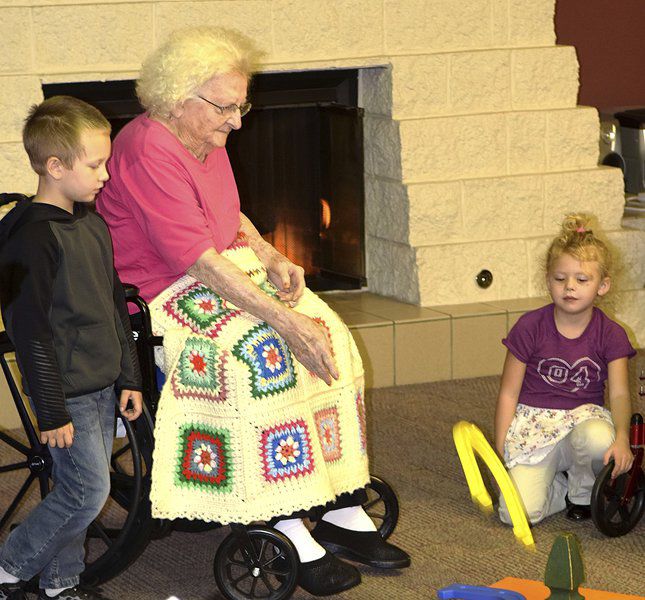The Enid Public Schools intergenerational pre-kindergarten class at The Commons garnered some international attention Wednesday, with an observer traveling from Britain to take home lessons from the program.
EPS parents select whether to enroll their children in the intergenerational program or the more traditional classroom programs at Carver Early Childhood Center and Northwestern Oklahoma State University-Enid.
Students enrolled in the intergenerational pre-kindergarten program attend class with residents at The Commons, a nursing home and retirement village. Lessons incorporate volunteers from all levels of the nursing home, from independent living residents to those in skilled nursing and dementia care units.
Chris Smith, EPS director of early childhood education, said the program is popular both with students and the nursing home volunteers. Children get more one-on-one attention, while their elders have a sense of purpose and enjoy the interaction, Smith said.
But, aside from the fun of doing crafts and reading together, Smith said the intergenerational learning provides the students with a key ingredient in early childhood development and learning: empathy.
“Children have to learn empathy before they can learn to read,” Smith said, “and what better way to learn empathy than to interact with grandmas and grandpas.”
Smith said EPS started the program in 2009 — only the second such program in the state, after Jenks. She said the intergenerational learning model hasn’t spread further, faster because it takes a special relationship between the nursing home and the school district.
“You have to have a very close relationship with the facility,” Smith said, “and we’ve had a very close, positive relationship with The Commons.”
Lisa Scott, administrator at The Commons, said the intergenerational classes are a benefit to the residents.
“The residents love it,” Scott said. “They look forward to the interaction with the children. Getting to participate in the learning with the children makes them feel like they’re still a valued part of the community.”
And, she said, the residents are an invaluable resource to children who might not get much interaction with an older generation.
“If a child doesn’t have a grandparent living close by, the residents can really become their surrogate grandmother or grandfather, and it’s very beneficial for both of them,” Scott said.
That kind of mutually beneficial relationship is what drew Lorraine George, an early childhood educator and teacher trainer, from her home in Torbay, in southwest England.
She said she first heard of the intergenerational learning concept in early childhood education from a school in Seattle, Wash. ,and then began researching other schools she might be able to observe so she could implement the program in England.
“We don’t really have any intergenerational co-located settings like this in England,” George said. “There is one in London, but it just started several months ago.”
Last year, she submitted a grant application to the Winston Churchill Memorial Foundation, which funds 100 grants each year for Britons to study abroad and bring back innovative ideas to implement at home.
George was one of 100 grantees selected from among more than 1,300 applicants.
She visited Enid on Wednesday as part of a tour that includes schools in Seattle, Oklahoma City, Clinton, Jenks and several stops in Kansas.
George said intergenerational early childhood education may be a new concept in Britain, but it is one that begs to implemented.
“When you watch the interactions they have, the two generations bring so much to each other,” George said, “and when you see how beneficial it is, you have to ask yourself ‘Why aren’t we doing this.’
“It’s just magical to watch them together,” George said. “There’s so much benefit in it to bringing the two generations together.”
Upon her return to England George plans to write and publish a research paper of her findings, advocating for broader use of the intergenerational learning model in Britain.
Wednesday was not the first time the EPS program has drawn attention from visiting educators. Teachers and researchers from as far away as Australia and South Africa have visited to observe the class, and representatives from the Chickasaw Nation and Oklahoma County visited The Commons in May in hopes of learning aspects of the program they could implement at home.
Smith said she expects that attention to continue, and she hopes it helps more school districts harness the benefits of intergenerational learning.
“Everyone who has come here has come with the intention of duplicating this when they get home,” Smith said. “It just provides a lot of benefits for both the children and the elderly.”
Story provided by: Enid News & Eagle
Written by: James Neal


